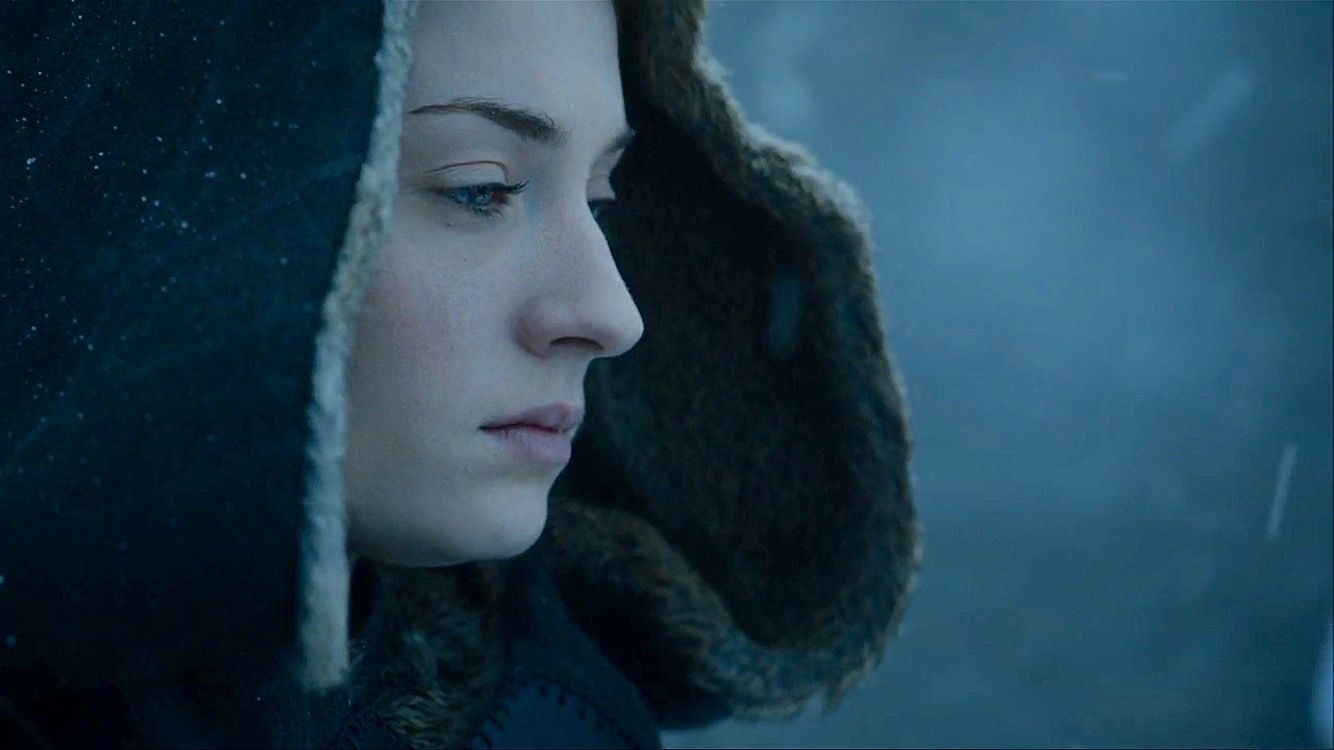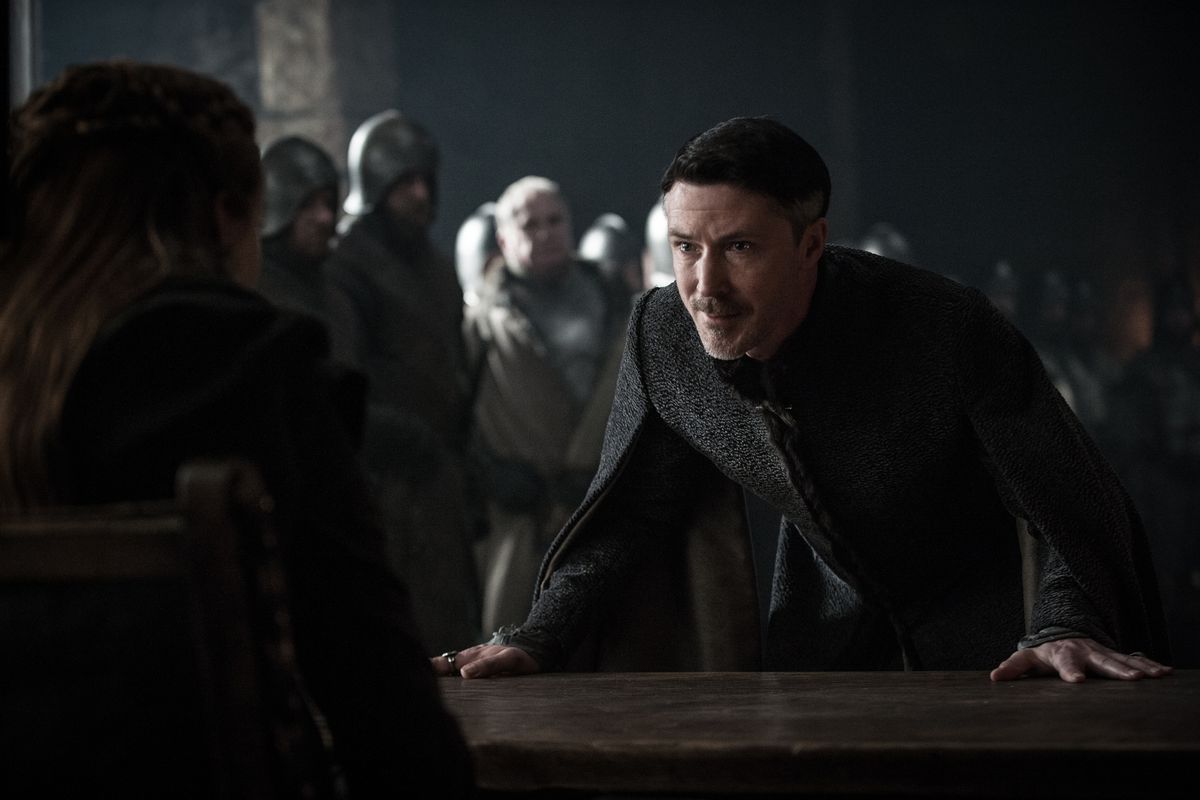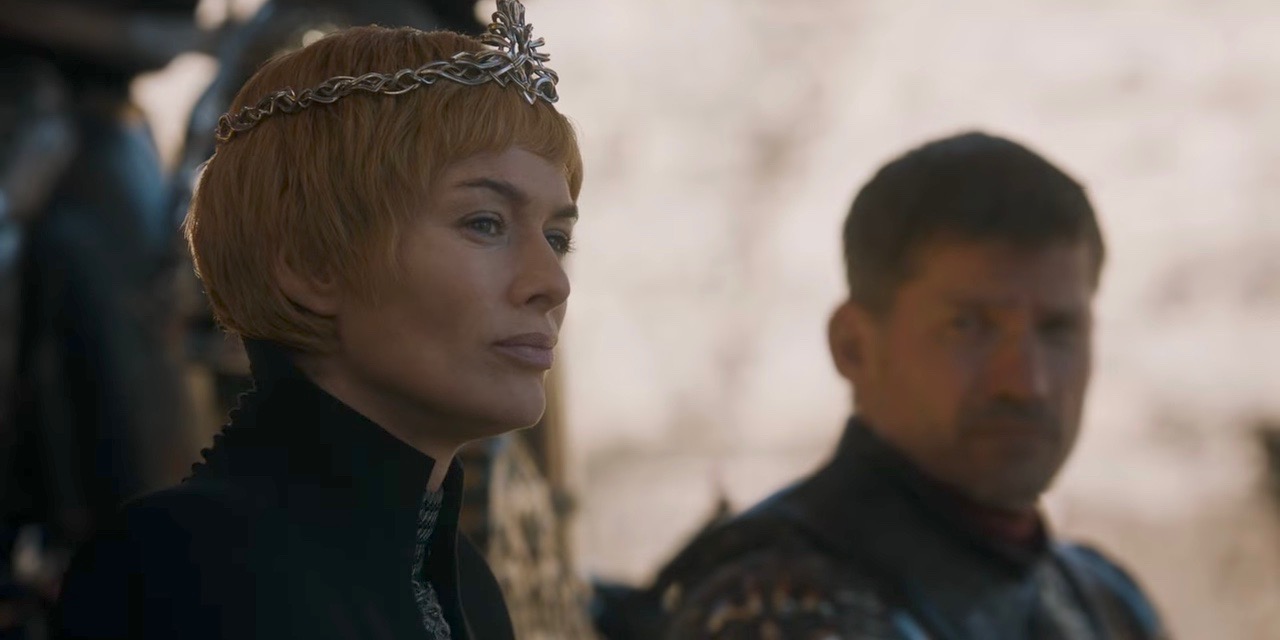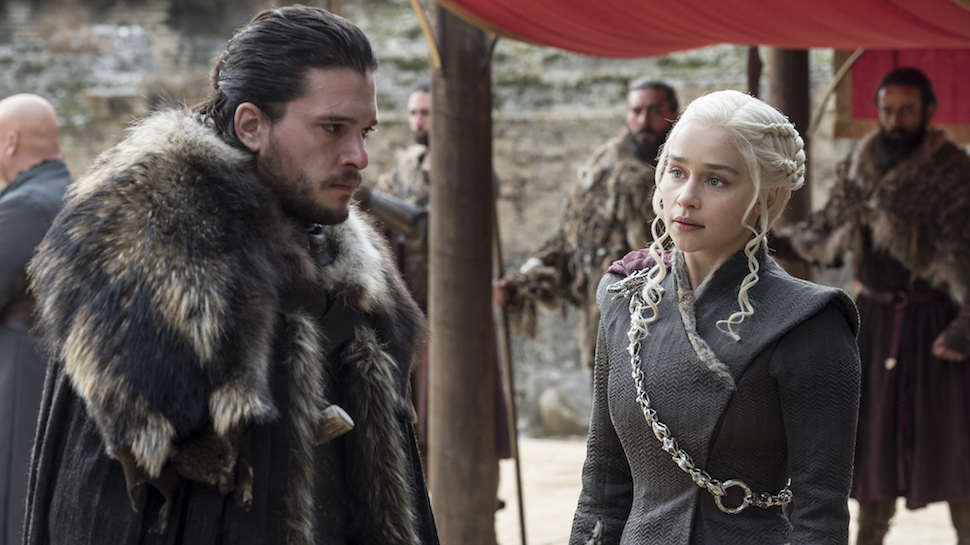[SPOILERS AHEAD for the final episode of Game of Thrones season seven, “The Dragon and the Wolf.”]
In the end, this short 7th season of Game of Thrones left us pretty much where we started: the army of the undead is still marching south, Daenerys and Cersei are still locked in a war for the iron throne, and Jon is still trying to save the world. Aside from the deaths of a few minor characters, and a few shifts of power as each side gained or lost resources, this season essentially served as the set-up to get all the important characters in motion for their endgame.
But it also helped shore up the core character traits of the main characters who’ll be hurtling toward their fates in the series’s final six episodes. With that in mind, let’s look at how the show has worked hard to define its characters, why it can sometimes feel like it forgets who they are, and why it feels so satisfying when it remembers its own point.
Defining Characters through Differences
In a sprawling ensemble show like Game of Thrones, it’s easier for the audience to keep track of who’s who (and what they each want) if the characters have distinctive, defining traits. By now, we should recognize the following:
Arya = the spirit of justice
Bran = the peril of knowledge
Cersei = the tragedy of ego
Daenerys = the challenge of ambition
Jaime = the burden of honor
Jon = the nobility of honesty
Sansa = the image of respectability
Theon = the uncertainty of identity
Tyrion = the enigma of appearances
Taking these individual themes into consideration, you can see how each character’s solo arc has required them to consistently choose between what they want to be and who they fear they are. For example:
Arya has always wanted to be a warrior and a rule-breaker while also being part of a loving, welcoming family. When her family was taken from her, she turned to revenge, amassing the skills necessary to execute it. But revenge is only a temporary satisfaction; her underlying desire is still to reunite and defend her family while marching to the beat of her own drum, which is what led to the (forced) tension between her and Sansa in season seven.
Sansa has always wanted to be the lady of a renowned lord without having to deal with the dirty parts of power like punishment and war. When her safety and honor were stripped from her, she had to learn how to survive by any means necessary. In doing so, she learned how power really works from master manipulators like Cersei, Ramsay, and Littlefinger. This season, she finds herself as the regent of Winterfell in Jon’s absence, which requires her to make the hard decisions she always hoped she’d never have to. She’s earned the title she always craved, but she can’t avoid the responsibility that comes with it.
Jon has always wanted to earn respect from those he considers honorable (and especially from his father figures like Ned, Jeor, and Mance), but his status as a bastard is a pre-existing condition that seems to make his ultimate goal of being judged by his actions rather than his heritage impossible. And yet, at every turn, his choices have been consistent with honesty and honor — in fact, he’s the only Stark who’s never done anything overtly dishonest or dishonorable, even when it would have been justifiable within the context of survival. This makes Jon the moral standard-bearer not just for Westeros but for the entire narrative.
Thus, his challenge is exemplified in his refusal to swear an oath to Cersei that he cannot honorably uphold even if saying those words could have been the difference between winning and losing to the Night King.
And so on.
Degrees of Extremity
Meanwhile, the secondary characters don’t get to enjoy as much of a personal arc, since they each exist primarily to support or challenge the goals of the primary characters. But each of them can also be summarized with an individual theme that underscores their purpose in the narrative. For example:
Beric = service
Brienne = idealism
Bronn = self-interest
Davos = righteousness
Grey Worm = duty
The Hound = hypocrisy (of others, and of belief systems)
Jorah = hope
Littlefinger = duplicity
Melisandre = dogma
Missandei = trust
Stannis = rules and order
Tormund = lust for life
Varys = adaptability
Seen in this light, one question to ask to find out the purpose and the future implications of any scene is: “What is the juxtaposition of the characters in this scene intended to highlight in terms of the scene’s (or series’s) theme?”
Let’s look at 3 answers to this question in scenes from Game of Thrones‘s season seven finale.
How Characters Clarify Theme
In “The Dragon and the Wolf,” the underlying theme is truth. Does it matter? And if so, why?
Every character and scene muses on some variation of truth, including:
- Bronn wonders aloud whether all conflict revolves around the illusion of manhood
- The Hound reminds The Mountain that he’s “always known” who’s coming for him
- Euron makes a seemingly honest admission that turns out to be a strategic ruse
- Brienne surprisingly rejects honor to support a greater truth: doing the right thing
- Jon’s true heritage is revealed, which is sure to complicate his alliance with Daenerys
By looking directly at the juxtapositions of the characters and scenarios in the episode’s three plotlines, we can see this theme illustrated even more clearly.
Sansa + Littlefinger + Arya
In the shadows of Winterfell, Littlefinger (duplicity) leads Sansa (the image of respectability) to distrust Arya (the spirit of justice). How? By seemingly convincing her that what Arya really wants is to rule Winterfell. In doing so, he’s hoping to convince Sansa to expel Arya, whom he sees as a threat to his closeness with Sansa.
The problem? To believe this, Sansa would have to trust a known liar more than her own sister, and she would have to believe that Arya wants something that is in direct opposition to her needs as a character.
As it turns out, Sansa uses her image of respectability to lead Littlefinger into thinking that she believes him… but really she’s working with Arya in order to dispense justice.
In the end, Sansa and Arya reflect on how much they miss their father. His memory will live on, in each of them, in part because they surfaced the truth and exposed Littlefinger’s deceptions. Thus, the truth does matter, because people want to unite around shared values instead of being divided by shared fears.
Tyrion + Cersei + Jaime
Tyrion (the enigma of appearances) has long been focused on the implications of power.
He’s repeatedly counseled Daenerys about the downside of winning with violence, he cautioned against attacking King’s Landing with a foreign army that Cersei would use as a xenophobic rallying point, and he encouraged Dany to inspire her followers by embodying a higher ideal. His advice often makes sense from a big-picture standpoint, even if his individual tactics don’t quite succeed.
That’s because, from the taking of Casterly Rock to the suicide mission of recovering a wight as a bargaining chip with Cersei, the tangible merits of his plans have been questionable all season. No matter how “wise” his choices may be, Cersei repeatedly outmaneuvers him, because her relentless focus on survival gives her more options than the aftermath-conscious Tyrion.
This all culminates in an attempted truce brokered by Tyrion that goes south fast. First Cersei denies Tyrion what he wants, and then she outwits him into falsely believing she’ll support his plan. She hopes this deception will cause her rivals to march into certain death while she hangs back to rule the remains.
The problem? Jaime — the one person left in this world that Cersei actually cares about other than herself — also believed that Cersei would support Tyrion, because Jaime (the burden of honor) believes that people should do what they say. He believes in oaths, and especially in protecting the people he’s sworn to lead and defend.
So when Cersei’s manipulations are revealed, Jaime is forced to make a decision: either stand with Cersei and do nothing, thus breaking what he thinks of as his oath to Tyrion’s coaltion, or reject her and ally with his enemies to oppose a common threat. Honor wins, and Jaime chooses to leave Cersei (the tragedy of ego) to her own devices.
Daenerys + Jon + Theon
Jon’s insistence on honesty is his defining trait, and honesty is a recipe for disaster in Westeros.
As such, when Cersei offers to ally with Daenerys against the undead only if Jon will recuse himself from resuming the battle for the iron throne afterward, he cannot agree to it because he has already pledged himself to follow Daenerys. This causes the truce that they’ve angled for this whole season to fall apart.
“Have you ever thought of lying?” Tyrion asks him angrily afterward. But of course Jon hasn’t. Because that’s not who Jon (the nobility of honesty) is. And his honor code is one of the reasons Daenerys (the challenge of ambition) trusts him and continues to support him… and fall in love with him. To her, Jon represents the physical embodiment of the ideals that Tyrion is always reminding her she needs to exude, even as great power makes doing something less noble (like burning a city to the ground) seem so alluring.
Win or lose in their battle against the Night King, they intend to fight for idealism too.
Back at Dragonstone, as Jon prepares to sail north for the fight of his life, Theon stops him.
Raised together since their childhoods, Theon and Jon have never been close, and Theon’s deplorable actions in recent years have hurt his foster Stark family more than they’ve helped. Despite this, Theon’s sister Yara tried to save him at his low point, and now he feels obliged to save her from her captivity with Euron.
The problem? Theon (the uncertainty of identity) is weak. He’s always struggled to define himself, and he often does so in opposition to those around him. Thus, what he’s really looking for from Jon isn’t just absolution for all his cowardly moments and craven actions; he’s looking for someone he respects to tell him he’s allowed to be a good man after all.
In perhaps the most surprisingly fulfilling moment in the episode, Jon — whose heritage has long been his own Achilles heel, and who still doesn’t know the truth about his own past — acts as Theon’s surrogate father figure / judge and tells Theon what he needs to hear: that Theon doesn’t need to choose who he’s going to be. He’s an Greyjoy and a Stark. Both things can be true.
In cutting to Theon’s reaction, director Jeremy Podeswa chooses to show us a profile view of Theon as Jon’s words sink in: he looks up, as if transformed internally. What’s interesting about this framing choice is that a profile view traditionally gives a viewer less visual information about a subject, and is often used to obscure a character’s essence. By only seeing half of his face, we’re left wondering if Theon can rectify the dueling halves of his persona: Stark and Greyjoy, Reek and Theon.
As noble as Jon’s sentiment may be, his words also have a deeper meaning that underscores the theme of this episode and the series as a whole: we can’t control how others define us, but our actions are what define us to ourselves.
If You Liked This Post
… then you may also enjoy this post on how Game of Thrones uses scene structure to reveal character, or this post about the ways Game of Thrones and The Walking Dead are actually the same show.
What Game of Thrones and The Walking Dead Can Teach Us About Modern Storytelling






1 Comment
Jeremy · January 13, 2020 at 10:54 pm
I have to say this is just a brilliant work you have done here. I am writing a fantasy ensemble series and I couldn’t figure out the structure of episodes. With many story lines in single episode, I couldn’t find a way to work it out as you can’t apply 3 act or 6 act structure with every scene. Thank you very much for writing and sharing articles like this!
Jeremy